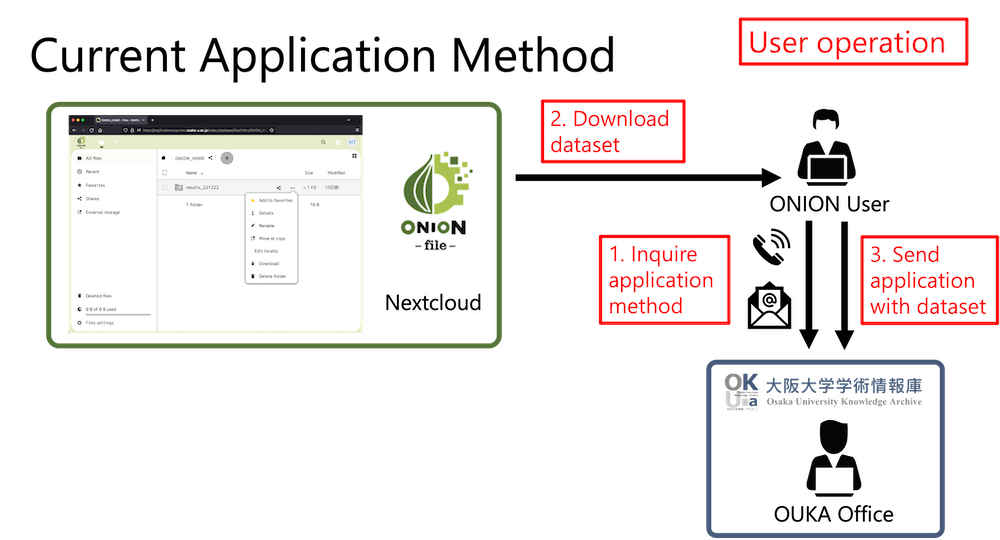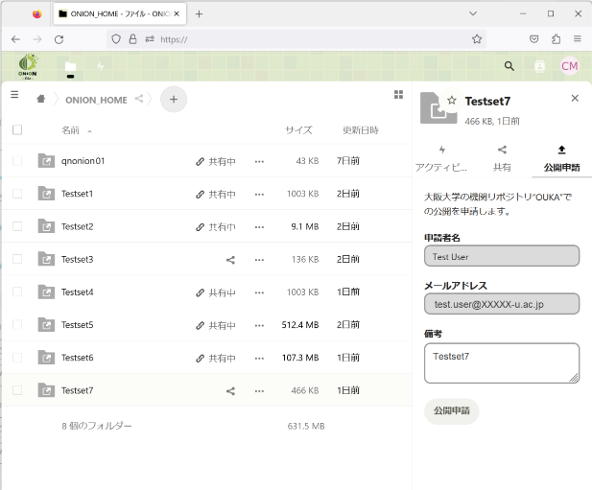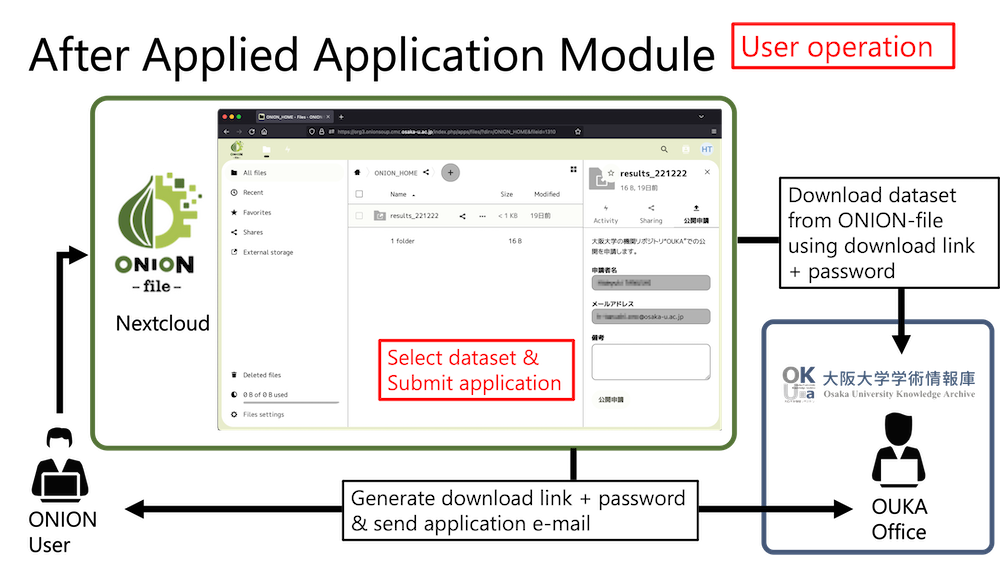Principal Researcher: Hideyuki Tanushi
In light of the recent escalating interest in open science both domestically and internationally, the University of Osaka has decided to promote open science. The promotion of open science was included in the joint communiqué at the G7 summit held in May 2023, and in response to these movements, the promotion of open science was also highlighted in the Cabinet Office's cabinet decision. In February 2024, the Cabinet Office's Council for Science, Technology and Innovation determined that recipients of public competitive research grants, which will be newly solicited from fiscal year 2025 onward, will be obligated to immediately publish their research papers and their supplemental data in academic journals and upload them to information infrastructure such as institutional repositories after publication.
As an information infrastructure for promoting open science, the University of Osaka has established ONION (Osaka university Next-generation Infrastructure for Open research and open innovatioN), a data aggregation infrastructure that collects data generated both inside and outside the campus, and OUKA (Osaka University Knowledge Archive), a data publication platform that electronically stores and publishes academic achievements. Researchers affiliated with this university can publish their academic achievements on OUKA. At the OUKA desk, metadata is assigned, copyright policies are confirmed as necessary, DOIs are registered, and data is registered in repositories. Anyone can search the registered data through the OUKA search function. In addition, catalog data is collected by search engines (such as OAIster and Google), and it is possible to view the registered data through these search engines (see Fig.1).

Fig. 1 Overview of OUKA
OUKA is promoting open access (green open access) for final author manuscripts, and since research data on ONION can serve as supporting data for academic papers, it is anticipated that there will be a growing need to publish research data from ONION through OUKA in the near future. However, ONION and OUKA are currently not linked in terms of functionality, so when researchers submit research data for publication, they must first download the data from ONION to their own local environment and then submit it to the OUKA office along with a publication application (see Fig. 2). In other words, the lack of functional coordination between ONION and OUKA creates a burden for researchers in the research data management process of "saving and publishing" research data throughout its lifecycle. Researchers themselves are responsible for managing research data, such as publishing academic papers and research data, which are essential for open access and open research data. It is important for academic institutions to reduce the burden of research data management on researchers.

Fig. 2 Current workflow of submitting research data for publication
In this study, we proposed, developed, and implemented a prototype that reduces the burden on researchers and allows them to easily and safely apply to publish their research data from ONION to OUKA without any additional burden. In order to reduce human interactions in publication applications and to realize a prototype that does not burden researchers' local storage environments, we developed a research data publication application module for Nextcloud using the proprietary plugin development function of Nextcloud, the software used by ONION (see Fig. 3). First, in order to reduce person-to-person interactions, we implemented a function that allows researchers to submit publication requests directly from ONION. This enables researchers to submit publication requests without having to contact the OUKA office. Next, in order to avoid placing a burden on researchers' local storage environments, we implemented a function that allows the OUKA contact point to download research data designated for publication directly from ONION. This enables researchers to provide research data for publication to the OUKA contact point without having to process it through their own environments (see Fig. 4).

Fig. 3 Research data publication application module for Nextcloud

Fig. 4 Workflow of submitting research data for publication after applied application module
The research data publication application module in this study is positioned as an experimental prototype implementation that explores the possibilities for building a new research data ecosystem at this university. While making maximum use of existing equipment, infrastructure, and operational methods, we proposed a model case in which researchers could apply to publish research data stored in ONION to the OUKA office without any additional burden, and transfer the data. Furthermore, through the trial operation of the research data publication application module, we aim to raise awareness of open science among researchers affiliated with this university and identify technical issues for the realization of a research data ecosystem that enables the smooth publication of research data.
[Journals]
Hideyuki Tanushi, Akihiro Yamashita, Takeo Hosomi, Yuta Namiki, Naoto Kai, Kanna Matsuura, Susumu Date, "Campus Information Infrastructure Collaboration Supporting Research Data Management", Journal for Academic Computing and Netwoking, 2023. [DOI: 10.24669/jacn.27.1_98] (in Japanese)